
In this update:
- Redistricting Updates
- Legislative Updates
- Administration Updates
- Election Updates
Redistricting Updates
Consultants submit briefs to court
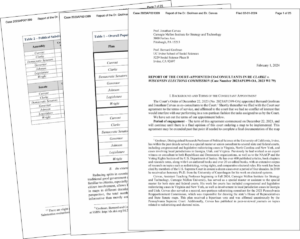
The two consultants appointed by the state Supreme Court submitted their report on the six legislative maps proposed by the parties involved in the redistricting litigation. The report from Prof. Jonathan Cervas and Prof. Bernard Grofman found the four maps supported by Democrats largely comply with the Court’s mandated criteria and are “nearly indistinguishable” from each other, while the maps from Legislative Republicans and the Wisconsin Institute for Law and Liberty (WILL) were dismissed as “partisan gerrymanders.” Of the four compliant maps, the consultants did not recommend the Court pick one in particular, but said the Court could instruct them to improve one of the maps with respect to the court-mandated criteria or create entirely new maps by combining features of more than one map. The consultants said they could quickly produce new maps if instructed to do so by the Court.
The constitutional criteria identified by the Court and used by the consultants to analyze each map submission include:
- Population Equality
- Political Subdivision Splits
- Contiguity
- Compactness
- Federal Law Compliance
- Communities of Interest Considerations
In addition to the criteria above, the Court also required the novel criteria of “political neutrality” to be considered by the consultants. Although political neutrality is not enshrined in state or federal law as it pertains to legislative redistricting, the majority on the Court directed the consultants use it as an evaluative metric, adding that “consideration of partisan impact will not supersede constitutionally mandated criteria…”. Based on the political neutrality criteria, the consultants said the Legislative Republicans’ map proposal was not worthy of further consideration by the Court. Meanwhile, the map produced by WILL was discounted as a “stealth gerrymander” because it “exhibits an extreme level of partisan bias” despite the maps scoring “very well on traditional good government criteria.” Although Republicans have pointed to the natural political geography of Wisconsin as being the main reason their maps favored Republicans, the consultants said the four maps supported by Democrats provide “compelling evidence that the geography of Wisconsin does not preclude the creation of good government maps that also seek to satisfy the goals of majority rule representation and avoiding political gerrymandering.”
The next key deadline in the remedial redistricting process ordered by the Court is February 8th, when each party to the litigation must submit a response brief to the consultants’ report.
Reaction:
Gov. Tony Evers (D): “This report plainly affirms for Wisconsinites what we’ve said all along: the maps Republicans submitted to the Wisconsin Supreme Court are nothing more than a partisan gerrymander. The days of Wisconsinites living under some of the most gerrymandered maps in the country are numbered. While this is just one step in this process, today is an important day for the people of Wisconsin who deserve maps that are fair, responsive, and reflect the will of the people.”
Wisconsin Institute for Law and Liberty: “The report hides its bias behind a fog of faux sophistication. Let’s be clear, our maps have been rejected for one reason and one reason alone, they don’t produce the partisan outcomes the experts or many on the Court want. So, they ignore all the traditional tests to distinguish partisan bias from political geography. It is what Chief Justice Roberts has called social science gobbledygook: Obfuscation that hides one’s preferences so that it needn’t be justified.”
Evers vetoes redistricting maps passed by legislature
Governor Tony Evers (D) vetoed the legislative maps Republicans in the state legislature passed last week. Gov. Evers released a video message on his social media platforms explaining his veto. “Wisconsinites don’t want Republican or Democrat maps because Wisconsin isn’t a red or blue state—we’re a purple state, and our maps should reflect that basic fact. Wisconsinites deserve maps that are fair, responsive, and reflect the will of the people, and my promise to the people of Wisconsin is that I will always fight for fair maps—I will not accept anything less,” Gov. Evers said.
The maps passed by the legislature were based on the maps submitted by Gov. Evers to the state Supreme Court as part of the redistricting case currently being heard by the court. However, the Republican version included changes from the original proposal that sought to unpair several GOP incumbents that would have been forced to run against each other under the governor’s original map submission. The governor pointed to those changes as the reason he vetoed the maps.
“The people of Wisconsin have lived under some of the most gerrymandered maps in the country for a decade. That’s a fact. These maps are more of the same. Republicans passed maps to help make sure Republican-gerrymandered incumbents get to keep their seats. Folks, that’s just more gerrymandering. Allowing politicians to move district lines so their party can retain political power doesn’t help root out gerrymandering from our democracy; it further entrenches it. And that’s wrong,” Gov. Evers said.
GOP Reaction
Speaker Vos: “I am disappointed but not surprised by Governor Evers’ veto. His claim that the maps he proposed were, ‘responsive to the will of the people, avoided partisan bias and increased competitive legislation seats,’ fell completely apart by a 0.3% change to stop a few politically vindictive incumbent pairings. By signing, he would have gotten 99.7% of the maps he’s proposed in court. This was never about fair maps. “His action today only solidifies his trust in the Wisconsin Supreme Court to give him even more partisan, gerrymandered maps for Democrats—the very thing the court’s newest justice promised on the campaign trail while receiving record-level Democratic Party campaign donations.”
Sen. Majority Leader LeMahieu: “Governor Evers speaks of compromise but governs as an extreme partisan. “The legislative map he vetoed today is more than 99% identical to the one he proposed to the Wisconsin Supreme Court. The changes the legislature made would have disenfranchised fewer Wisconsinites than the Governor’s submission, and would have undone a small handful of the Governor’s most egregious incumbent gerrymanders. “The Governor could have taken yes for an answer and gotten more than 99% of what he wanted. Instead he vetoed his own maps because he is confident that the Wisconsin Supreme Court will trample the constitutional authority of the legislature.”
To read Gov. Evers’ press release and the transcript of his video message, click here.
To watch Gov. Evers’ video message, click here.
To read the Governor’s veto message, click here.
Motion filed requesting Protasiewicz recuse herself
Republicans and the Wisconsin Institute for Law & Liberty filed a motion for liberal Justice Janet Protasiewicz to recuse herself from the suit challenging Wisconsin’s congressional lines due to prejudice. The motion is reminiscent of GOP lawmakers’ unsuccessful attempt to remove Justice Protasiewicz from the legislative redistricting lawsuit. The new motion also cites the nearly $10 million spent by the Democratic Party of Wisconsin in support of her 2023 campaign and her comments made about the maps being drawn to favor Republicans. “Just as a judicial candidate could not declare, ‘John Smith is guilty’ and then, once elected, hear his appeal, Justice Protasiewicz cannot decide to re-open this case after she has declared that she agreed with the dissenters in this case and that ‘something’s wrong’ with the congressional districts already adopted in this case,” the motion argues.
Elias Law Firm with a group of Democratic voters requested the state court to reopen the last congressional redistricting case, citing the legislative redistricting ruling. The legislative redistricting case ruled that it was incorrect to use a “least change” approach to the lines drawn in 2011 by Republicans. The current suit argues that the court rejecting the “least change” method means the current congressional lines have no basis since they were drawn following that approach. The court has taken no action on the motion.
Legislative Updates
Speaker’s AI task force issues report
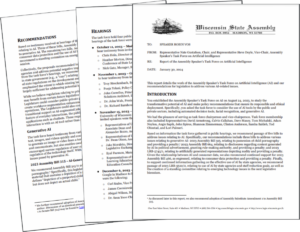
The Assembly Speaker’s Task Force on AI issued its report which includes recommendations for legislation to address various AI-related issues. Over the past six months, the task force held four public hearings where it received testimony from invited speakers and the public. Rep. Nate Gustafson (R), chairman of the task force, called the report “an opportunity to ensure that Wisconsin remains a leader in responsible AI development, benefiting all sectors of our society.” He also noted the task force recommended against creating a state office or specific position in state government relating to AI. State regulations on the development and application of AI by the private sector were also recommended against by the task force. Rep. Gustafson also was on WisEye’s “NewsMakers” to further discuss the findings and recommendations made by the task force.
Other recommendations made by the task force include the following:
Generative AI
- 2023 Assembly Bill 315 (AI-Generated Child Pornography): Under this bill, a person is guilty of possession of child pornography if he or she knowingly receives, distributes, produces, possesses, or accesses with the intent to view, obscene photographs, film, motion pictures, or digital or computer-generated images or pictures that contain a visual representation that appears to depict an actual child engaged in sexually explicit conduct although the representation does not depict an actual child.
- 2023 Assembly Bill 664 (AI-Generated Content in Political Advertisements): This bill requires that any audio or video communication that is paid for by a candidate committee, legislative campaign committee, political action committee, independent expenditure committee, political party, recall committee, or referendum committee with a contribution or disbursement make certain disclosures if the communication contains synthetic media. The bill defines “synthetic media” as audio or video content substantially produced by means of generative artificial intelligence. Additionally, the bill specifies particular disclosure language that must be provided in audio or video communications that contain synthetic media.
- 2023 LRB–5745/1 (AI-Generated Intimate Representations): This bill provides that it is a Class I felony to post, publish, distribute, or exhibit an artificially generated, intimate representation that contains an identifiable person’s recognizable personal characteristic with the intent to coerce, harass, or intimidate that person.
Data Protection
- 2023 Assembly Bill 466 (Consumer Data Protection): This bill provides a consumer certain rights to control over their personal data and creates responsibilities for any controller or processor of personal data.
Legislative Oversight
- LRB-5522/2 (State Agency AI Use): This bill directs an audit of state agencies, creates agency reporting requirements, and establishes goals for agencies to reduce their workforce needs through the use of AI tools.
Creation of a Standing Committee Relating to Emerging Technology
- To ensure ongoing legislative oversight and to carry forward the efforts of the task force, the report recommends that a standing committee on emerging technologies be established in the next biennium.
Considine won’t seek reelection
 State Representative Dave Considine (D) announced that he will not seek another term this fall. Rep. Considine has represented the 81st Assembly District since 2014. “I am grateful for the privilege of serving the constituents of the 81st Assembly District and surrounding areas. I have enjoyed this job immensely and am honored to have been elected to serve each of you and the citizens of our state … In my retirement, I look forward to spending more time with my grandchildren and attending the many events in which they participate. I also plan on spending more time outside on the farm, golf course, campground, and bike trail,” he said in his press release.
State Representative Dave Considine (D) announced that he will not seek another term this fall. Rep. Considine has represented the 81st Assembly District since 2014. “I am grateful for the privilege of serving the constituents of the 81st Assembly District and surrounding areas. I have enjoyed this job immensely and am honored to have been elected to serve each of you and the citizens of our state … In my retirement, I look forward to spending more time with my grandchildren and attending the many events in which they participate. I also plan on spending more time outside on the farm, golf course, campground, and bike trail,” he said in his press release.
Other lawmakers not running for reelection include:
- Evan Goyke, D-Milwaukee, running for Milwaukee City Attorney on the spring ballot
- Katrina Shankland, D-Stevens Point, running for Wisconsin’s 3rd Congressional District
- Sen. Lena Taylor, D-Milwaukee, appointed to the Milwaukee County Circuit Court
Additionally, state Rep. Marisabel Cabrera, D-Milwaukee, is running for Milwaukee County Circuit Court on the spring ballot, but will only vacate her seat if she wins.
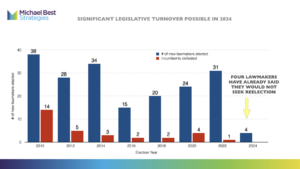
Hesselbein announces updated committee assignments
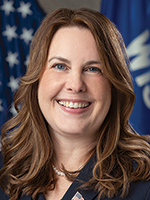 Last week, Governor Tony Evers (D) announced he appointed Sen. Lena Taylor (D) to the Milwaukee County Circuit Court, leaving her state Senate seat open. The appointment was effective Tuesday and fills the vacancy left by Judge Audrey Skwierawski when she was tapped by the state Supreme Court to take over as director of state courts in August 2023. Sen. Taylor will serve the remainder of Judge Skwierawski’s term, which is set to expire July 31, 2025.
Last week, Governor Tony Evers (D) announced he appointed Sen. Lena Taylor (D) to the Milwaukee County Circuit Court, leaving her state Senate seat open. The appointment was effective Tuesday and fills the vacancy left by Judge Audrey Skwierawski when she was tapped by the state Supreme Court to take over as director of state courts in August 2023. Sen. Taylor will serve the remainder of Judge Skwierawski’s term, which is set to expire July 31, 2025.
As a result of Sen. Taylor’s new role, here are Sen. Dianne Hesselbein’s nominations to committees (changes are in italics):
Committee on Judiciary and Public Safety
Senator Kelda Roys (ranking)
Senator LaTonya Johnson
Committee on Insurance and Small Business
Senator Brad Pfaff (ranking)
Senator Bob Wirch
Committee on Economic Development and Technical Colleges
Senator Brad Pfaff (ranking)
Senator Chris Larson
Committee on Education
Senator Chris Larson (ranking)
Senator Melissa Agard
Joint Survey Committee on Tax Exemptions
Senator Dianne Hesselbein
Joint Review Committee on Criminal Penalties
Senator Kelda Roys
Administration Updates
Evers establishes new task force on healthcare workforce
Governor Tony Evers (D) announced he signed Executive Order #220 to create the Governor’s Task Force on the Healthcare Workforce and appointed Lieutenant Governor Sara Rodriguez as Chair. The governor announced the task force during last week’s State of the State address, and the task force is entrusted with creating an action plan to address the chronic challenges in the state’s healthcare industry and bolster the healthcare workforce. Chair Lt. Gov. Sara Rodriguez is a registered nurse and holds master’s degrees in nursing and public health. Along with Lt. Gov. Rodriguez, the task force also includes Wisconsin Department of Workforce Development (DWD) Secretary Amy Pechacek or a designee, Wisconsin Department of Health Services (DHS) Secretary Kirsten Johnson or a designee, representatives from the state’s higher education institutions, and other individuals appointed by the governor.
“Wisconsin faces a potential deficit of 20,000 nurses by 2040—a figure that paints a concerning picture for the future of one of our most relied-upon industries. Making sure our workforce is prepared to meet the needs of a 21st-century economy is a top priority for me and must be a top priority for our state, including the Legislature,” said Gov. Evers. “My administration will continue pursuing every pathway and seeking every avenue to address our workforce challenges without legislative action, just as we have for five years. This task force, led by the lieutenant governor, is going to play a critical role in our administration’s work toward real, impactful solutions to alleviate the burdens experienced by folks in our healthcare workforce now and into the future.”
To read Gov. Evers’ press release, click here.
Evers signs five bills related to dental care and workforce
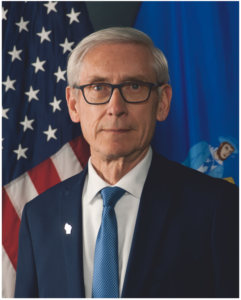 Governor Tony Evers (D) signed five bipartisan bills that improve access to dental care, primarily in rural communities, and bolster the dental workforce. Gov. Evers signed the bills at a public bill signing ceremony at Northcentral Technical College (NTC) in Wausau. NTC offers premier dental hygienist and dental assistant programs and will receive up to $2 million to support these programs under SB 702.
Governor Tony Evers (D) signed five bipartisan bills that improve access to dental care, primarily in rural communities, and bolster the dental workforce. Gov. Evers signed the bills at a public bill signing ceremony at Northcentral Technical College (NTC) in Wausau. NTC offers premier dental hygienist and dental assistant programs and will receive up to $2 million to support these programs under SB 702.
“The health and well-being of our state and our economy depend on the health and well-being of our communities, including ensuring that all Wisconsinites have access to quality, affordable healthcare. I am proud to sign these five bipartisan bills that will move us forward in our work to address shortages and bolster our dental healthcare workforce while also closing gaps in access across the state,” said Gov. Evers. “Coupled with my administration’s new Healthcare Workforce Task Force, these bills will help us build upon our administration’s work to support and strengthen this workforce and ensure more folks can get the dental care they need, especially in our rural communities while finding real, long-term solutions to address the challenges our healthcare industry faces today.”
The package of bills the governor signed includes:
- Senate Bill 689, now 2024 Wisconsin Act 87
- Senate Bill 692, now 2024 Wisconsin Act 88
- Senate Bill 702, now 2024 Wisconsin Act 89
- Senate Bill 706, now 2024 Wisconsin Act 90
- Assembly Bill 62, now 2024 Wisconsin Act 91
For Gov. Evers’ press release and more about the signed bills, click here.
Election Updates
New polling on potential Biden/Trump rematch
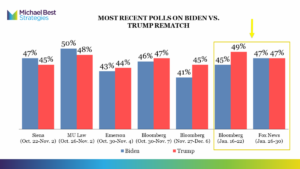
Bloomberg and Fox News released new Wisconsin polling results this week.
Bloomberg/Morning Consult
- A poll of registered voters in Wisconsin found 49% would vote for former President Donald Trump (R) in the November 2024 presidential election, while 45% said they would vote for President Joe Biden (D). The Wisconsin report was part of a larger survey of swing state votes.
- The poll surveyed 4,956 registered voters in seven states, including 697 in Wisconsin, between Jan. 16-22. The margin of error is +/- 4 percentage points. The surveys were conducted online and weighted to approximate a target sample of registered voters in the state based on gender, age, race/ethnicity, marital status, home ownership, and 2020 presidential vote.
- FiveThirtyEight rates Morning Consult 1.8 out of 3 stars.
Fox News/Beacon Research and Shaw & Company Research
- A poll of registered voters in Wisconsin found 47% would vote for former President Donald Trump (R) in the November 2024 presidential election, while 47% said they would vote for President Joe Biden (D).
- The poll surveyed 1,172 registered voters in Wisconsin between Jan. 26-30. The margin of error is +/- 3 percentage points. The surveys were conducted using live interviewers on landline and cellphone, as well as online using a survey. When necessary, weights are generally applied to age, race, education, and area variables to ensure the demographics of survey respondents are representative of the registered voter population.
- FiveThirtyEight rates Beacon Research/Shaw & Co. Research 2.8 out of 3 stars.
Q4 fundraising round-up
U.S. Senate Delegation
Raised: $2.6 million
Spent: $1.7 million
Cash on hand: $8.03 million
Raised: $841,458
Spent: $921,270
Cash on hand: $424,301
3rd CD Race
U.S. Rep. Derrick Van Orden (R)
Raised: $582,254
Spent: $400,256
Cash on hand: $1.6 million
Raised: $329,974
Spent: $139,753
Cash on hand: $496,592
Raised: $212,783
Spent: $169,660
Cash on hand: $143,123
Raised: $25,684
Spent: $6,356
Cash on hand: $19,328
1st CD Race
Raised: $527,482
Spent: $135,422
Cash on hand: $3.6 million
Raised: $4,868
Spent: $6,959
Cash on hand: $2,660
Remaining U.S. House Delegation
Raised: $181,951
Spent: $418,825
Cash on hand: $4.04 million
Raised: $103,107
Spent: $80,516
Cash on hand: $770,797
Scott Fitzgerald (R-WI 5th CD)
Raised: $175,537
Spent: $82,382
Cash on hand: $694,622
Raised: $215,427
Spent: $157,657
Cash on hand: $558,443
Raised: $114,619
Spent: $103,481
Cash on hand: $472,336
Raised: $121,475
Spent: $157,877
Cash on hand: $26,128



